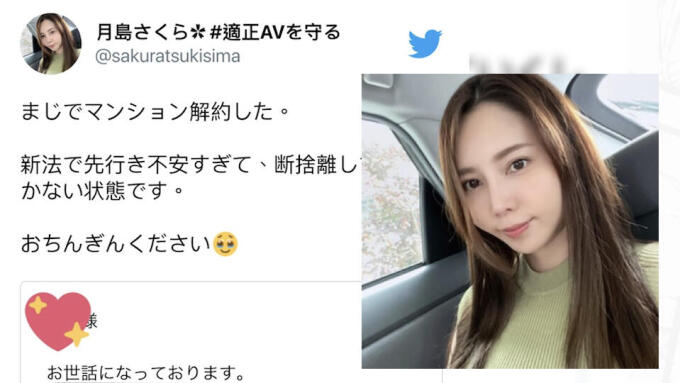TOKYO — Weeks after the Japanese parliament passed a law purporting to protect female talent from supposedly predatory adult industry contracts, noted performer and “JAV idol” Sakura Tsukishima has revealed on Twitter that she was forced to give up her apartment due to unreasonable changes the legislation is forcing on the local adult industry.
Tsukishima tweeted that she had to give two months' notice on her apartment due to the sudden precipitous decline in her projected income, caused by the virtual shutdown of production while companies try to figure out how they can continue shooting now that the Japanese government has rendered adult industry contracts unenforceable.
While the propaganda campaign waged against the industry by an alliance of feminist and religious conservative legislators highlighted only “girls between 18 and 21,” the new law empowers any performer of any age or gender to withdraw, at any time, their consent for companies to distribute adult material in which they appear.
“For real,” Tsukishima wrote, “I have canceled my lease. I am too worried about my future due to the new law and I find myself in a situation in which I have no option but to leave my home. Please, I need work.”
She later added, “I chose my rooms and I designed them. I have enjoyed building my own furniture. When I remember all this, I regret having to leave my apartment. It’s a difficult situation.”
Pointing her finger at legislators who refused to acknowledge statements by sex workers, advocates and the adult industry that the law would be harmful, Tsukishima also tweeted, “We are active and we know the industry better than anyone. But they didn’t ask our opinion about this law. They only listened to ‘human rights’ groups and they wrote that law. This is really unacceptable.”
She called on her fans to help her make sure the parliament hears “the real voices” of performers.
A Controversial Law With Chilling Effects on Sexual Expression
As XBIZ reported, a legislative debate in recent weeks about lowering the age of legal majority in Japan quickly devolved into a sensationalist campaign about adult performers aged 18-19; the age-of-majority bill was passed unanimously in a plenary session of the nation's House of Representatives in late May, and subsequently passed at a plenary session of the House of Councillors, the upper house of Japan's legislature.
Japanese newspaper The Mainichi described the new law as "marking a step in efforts to end abuses of those involved in the industry in Japan."
The law "allows people who agree to appear in pornographic content to terminate their contracts at any time before the film's public release without conditions, as well as up to a year afterward," reported The Mainichi. "However, as a special measure, a review period of up to two years after a film's release will apply for the first two years after the law's promulgation. If the contract is terminated, video vendors are obliged to recover the products and delete the footage, and cannot claim compensation from the performers."
The new law also mandates that "a month must pass between the signing of a contract and the filming of the video, and four months between the filming of the video and its public release," noted the newspaper. "This gives enough time for those who appear in them to reconsider whether they still want to make the film and release it. Producers must additionally provide a written explanation to performers describing the nature of the content, including specific sexual acts required during filming, and the fact that they may be identifiable."
Punishment for violating the new law includes hefty fines and a prison term of up to three years.
Conservatives, Feminists Join Forces for Sensational Headlines
XBIZ spoke with a Japanese producer familiar with the situation, who said this headline-grabbing attack on the adult video community in the name of “protecting the youth between 18 and 20” was the product of an alliance between political and religious conservatives and Japanese feminists.
The source told XBIZ that the new law was introduced, in response to the recent lowering of the age of majority in Japan to 18 this year, by politicians who only care about the next election and who did not listen to any of the actual parties involved.
The source also said that debate on the issue is being muddled by the country's hypocrisy about sexual expression, as exemplified by the “mosaic,” or pixilation, required to be imposed over images of genitals.
“Even the Japanese law loves the gray area around sexual content,” the source told XBIZ. “The Supreme Court has even ruled that ‘adult content’ is technically legal because ‘there is no explicit sex behind the mosaic’ — even though everyone knows that actual people are having actual sex behind the mosaic.”






